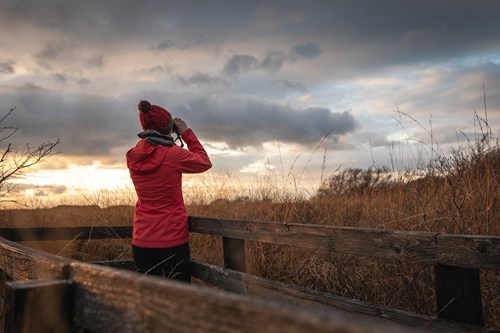The Arch, near Aberystwyth
Walks through huge beech trees with views over...

Cors Fochno is part of the Dyfi National Nature Reserve, situated midway between Aberystwyth and Machynlleth.
Known locally as Borth Bog, Cors Fochno is one of the largest and finest remaining examples of a raised peat bog in Britain - peat has been accumulating here gradually and continuously for over 6,000 years and now reaches a depth of over 6 metres.
The short walk from the small parking area includes a circular boardwalk around the edge of the bog.
The walking trail is waymarked from start to finish.
Look out for the information panel at the start of the trail.
Find out about walking trail grades.
Enjoy views over the huge peat bog on the circular boardwalk.

Cors Fochno is part of the Dyfi National Nature Reserve.
This 2,000 hectare reserve also includes the Dyfi estuary and Ynyslas sand dunes.
Ynyslas Visitor Centre is the main access point to the Dyfi National Nature Reserve.
National Nature Reserves are places with some of the very finest examples of wildlife habitats and geological features.
The landscape and wildlife varies depending on which time of year you visit – here’s what to look out for.
The bog’s formation started around 5500 BC when part of the estuary floodplain was covered by forest, but as sea levels rose, the forest was replaced by reed swamp and then peat bog.
The most westerly part is now eroded by the sea, but at low tide the stumps of long dead trees can still be seen on the beach near Borth.
The bog’s surface today is dominated by a tapestry of green, gold and red sphagnum mosses and many rare and unusual species live here including insectivorous plants like sundews, the rosy marsh moth and small red damselfly.
Many rare and specialised invertebrates survive here.
They include:
The waterlogged bog surface is a hostile place for most plants, and those that thrive here, like bog cotton, bog asphodel and bog myrtle, all have special adaptations.
Carnivorous plants also come into their own here including all three native species of sundews.
The most important bog specialist plants (and the main peat-formers), are the bog mosses or sphagnums, which form colourful carpets on the open bog and raise its surface into a shallow dome as their remains accumulate.
Fifteen species of bog moss occur here including three national rarities.
There are over 70 National Nature Reserves in Wales.
Find out more about National Nature Reserves.
Cors Fochno is one of seven places in the Welsh Raised Bogs Project.
This project is the first national restoration programme for raised bogs in Wales.
Cors Fochno is one of the largest actively growing raised bogs in the lowlands of Britain, with peat up to 8 metres deep.
Raised bogs are one of Wales’ rarest and most important habitats and are home to rare plants and wildlife.
Raised bogs get their name because of their domed shape. They are areas of peat that have built up over 12,000 years and can be as deep as 12 metres.
To learn more about the restoration work, sign up for e-newsletters and read our news releases, go to the Welsh Raised Bogs project webpage.
The Wales Coast Path runs along the southern and eastern edge of Cors Fochno between Borth and Tre Taliesin.
The Wales Coast Path provides a continuous walking route around the coastline of Wales.
For more information go to the Wales Coast Path website.
Cors Fochno is within the UNESCO Dyfi Biosphere.
Biospheres inspire communities to work together in creating a future we can all be proud of, connecting people with nature and cultural heritage, while strengthening the local economy.
For more information go to the Dyfi Biosphere website.
We want you to return home safely after your visit here.
You are responsible for your own safety as well as the safety of any children and animals with you during your visit.
Please note:
For advice and tips to help you plan your visit here go to Visiting our places safely.
See the top of this webpage for details of any planned closures or other changes to visitor facilities here.
For your safety, always follow instructions from staff and signs including those for trail diversions or closures.
We may divert or close trails whilst we undertake maintenance work or other operations and we may need to close other visitor facilities temporarily.
In extreme weather, we may close facilities at short notice due to the risk of injury to visitors and staff.
You may need permission from us to organise an event or to carry out some activities on our land.
Check if you are allowed to use our land.
Cors Fochno is 11 miles north of Aberystwyth.
The postcode is SY24 5LB.
Please note that this postcode may not take you to the car park if you use a sat nav or navigation app.
We suggest you follow the directions below or use the Google map on this page which has a pin on the track that leads to the car park.
From Aberystwyth, take the A487 towards Machynlleth.
After around 9 miles, in Tre’r-ddôl, turn left towards Ynyslas on the B4353.
Continue for around 1½ miles and turn left onto a small track with a gated entrance.
Drive down this track, closing the gate after driving through, to the small parking area (about 600 metres along the track).
View this place on the What3Words website.
The Ordnance Survey (OS) grid reference for the car park is SN 633 922 (Explorer Map OL 23).
The nearest mainline railway station is in Borth.
For details of public transport go to the Traveline Cymru website.
Parking is free of charge.
The small parking area is reached by driving down a narrow track with a gate at the entrance.
Overnight parking is not permitted.
There are no staff at this location.
Contact our customer team for general enquiries during office hours, Monday to Friday.